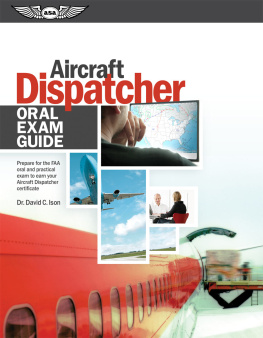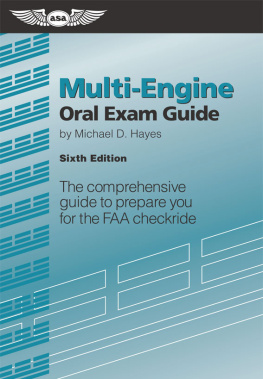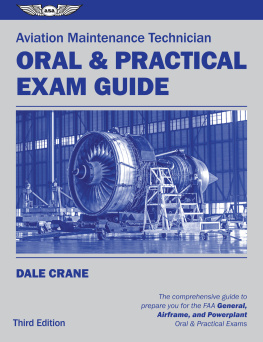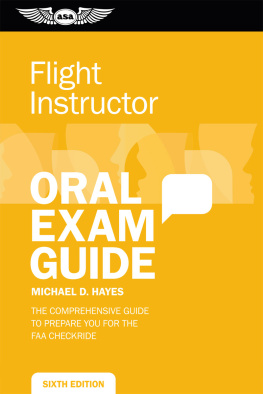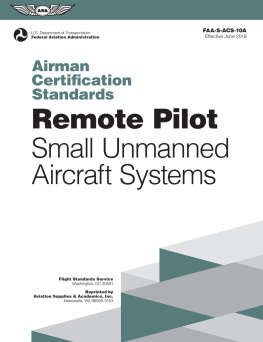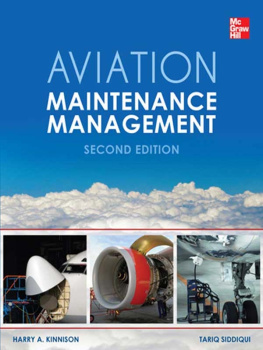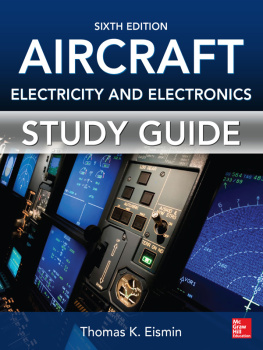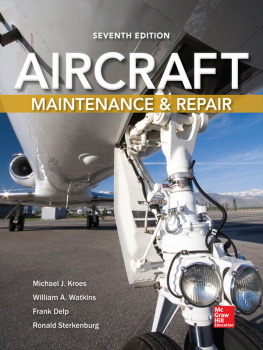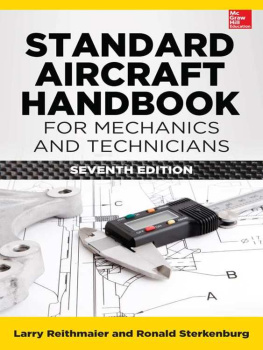Aircraft Dispatcher Oral Exam Guide
David C. Ison
Based on the Oral Exam Guide Series by Michael D. Hayes,
with excerpts from the Airline Transport Pilot Oral Exam Guide.
Aviation Supplies & Academics, Inc.
7005 132nd Place SE Newcastle, Washington 98059-3153
asa@asa2fly.com www.asa2fly.com
Visit the ASA website often to find updates posted due to FAA regulation revisions that may affect this book.
2011 Aviation Supplies & Academics, Inc. All rights reserved. No part of this book shall be reproduced, stored in any retrieval system, or transmitted by any means, electronic, mechanical, xerographic, audio/visual record, or otherwise, without written permission from the publisher. While every precaution has been taken in the preparation of this book, the publisher and David C. Ison assume no responsibility for errors or omissions. Neither is any liability assumed for damages resulting from the use of the information contained herein. None of the material in this guide supersedes any documents, procedures, or regulations issued by the Federal Aviation Administration.
ASA-OEG-ADX-EB
epub ISBN 978-1-56027-901-3
LC#2011046476
Introduction:
What to Expect for Your ADX Practical Test
The Aircraft Dispatcher Practical Test Process
As with any testing process, the more you know about it, the less stressful and overwhelming it is. The Aircraft Dispatcher (ADX) certification is not overly difficult to acquire. The information you must know prior to sitting for the ADX practical test is fairly straightforward; however, ADX certification does require knowledge in a wide range of subject areas which would necessitate a tremendous amount of study and preparation. Applicants who put in ample study time and take advantage of available preparation tools, such as this book, should be well prepared for the test.
While this book is an excellent means of preparing for the ADX practical test and is based upon actual questions used on ADX practical tests, it should not be the only source of study. Applicants should first participate in a ground school course specific to dispatchers and/or read the books listed under References (below), then conclude their study with a comprehensive review of this book.
Practical Test Standards (PTS)
The Federal Aviation Administration (FAA) publishes guides to the practical tests for each certification that they issue, known as the Practical Test Standards (PTS). The PTS guides tell applicants exactly what to expect, what subject areas or tasks will be covered, and what they need to bring with them on test day. The PTS for the ADX is designated FAA-S-8081-10 and can be found on the FAA website or in print, often combined with the PTS for Airline Transport Pilot (ATP).
The PTS are broken into several parts: areas of operation, tasks, and references. Areas of operation form an outline of what general subjects will be covered. Although they are presented in a logical sequence according to the FAA, examiners do not necessarily follow this order. Tasks are the actual knowledge areas or procedures that will be covered under each area of operation. References are provided for each area of operation and task in order to provide applicants the source documents examiners will defer to for the correct responses. Applicants should study these documents in preparation for the exam. The list below includes these PTS references, as well as additional resources helpful in preparing for your ADX exam.
Examiners are required to use the PTS. They are also technically required to cover all areas of operation and their associated tasks. Some omissions are permissible if, for example, a certain technology or piece of equipment is not available at the testing site. It is advisable, though, to be prepared for all areas of operation and tasks. It is also possible that the examiner will venture outside the confines of the PTS to probe the applicant in subjective areas such as judgment, decision making, and ethics.
References
The following is a list of ADX references to source books, documents, handbooks, etc., that are useful in preparing for certification:
14 CFR Part 1 Definitions and Abbreviations
14 CFR Part 65 Certification: Airmen Other than Flight Crewmembers
14 CFR Part 91 General Operating and Flight Rules
14 CFR Part 119 Certification: Air Carriers and Commercial Operators
14 CFR Part 121 Operating Requirements: Domestic, Flag, and Supplemental Operations
14 CFR Part 135 Commuter & On Demand Operations
14 CFR Part 139 Airport Certification
49 CFR Part 175 Carriage by Aircraft
49 CFR Part 830 Notification and Reporting of Aircraft Accidents or Incidents and Overdue Aircraft, and Preservation of Aircraft Wreckage, Mail, Cargo, and Records
49 CFR Part 1544 Aircraft Operator Security: Air Carriers and Commercial Operators
AC 00-6Aviation Weather
AC 00-45Aviation Weather Services
AC 60-22Aeronautical Decision Making
AC 120-42Extended Operations (ETOPS and Polar Operations)
AC 121-32Dispatch Resource Management Training
Aeronautical Chart Users Guide
AIM Aeronautical Information Manual
Air Traffic Control Command Center (ATCCC) website (www.fly.faa.gov)
ARINC website (Aeronautical Radio, Inc.) (www.arinc.com/products/voice_data_comm/)
Airport/Facility Directory legend (aeronav.faa.gov)
Aviation Weather Center (aviationweather.gov)
Boeing (www.boeing.com)
Boeing 737 Flight Manual
Defense Internet NOTAM Service (https://www.notams.faa.gov)
Eurocontrol (www.ecacnav.com/content.asp?CatID=24)
European Space Agency (ESA) (www.esa.int/esaNA/egnos.html)
FAA (www.faa.gov)
FAA-H-8083-2Risk Management Handbook
FAA-H-8261-1Instrument Procedures Handbook
FAA-H-8083-25Pilots Handbook of Aeronautical Knowledge
FAA-S-8081-10Aircraft Dispatcher Practical Test Standards
Flight Standards Information Management System website (fsims.faa.gov)
ICAO website (www.icao.int)
Jeppesen navigational charts, introductory section
National Weather Service (NWS) website (www.nws.noaa.gov)
North Atlantic MNPSA Operations Manual, 8th edition
Turbulence: A New Perspective for Pilots, by Peter F. Lester
FAA Examiners
Each FAA practical test examiner is a unique individual. Some are laid back and amicable, while others are more formal and serious. Try to find out as much information as you can about your examiner prior to the practical experience. But do not let your guard down even if the rumor is that a particular examiner is easy. The ADX practical test will still be an arduous process, no matter who your examiner is on test day. Get a feel for the personality of the examiner when you first meet, then try to mirror their general demeanor.
Here are few tips concerning examiners:
Never argue with an examiner.
Never be belligerent with an examiner.
Most examiners will want to teach you something at some point during the testing processlet them do so.
Answer questions thoroughly, but avoid saying too much. Let the examiner ask for more if they want more. Do not dig yourself into a hole.
Be polite and courteous.
Ask about how they got into dispatch, their experiences, and their career.
Do not be afraid of saying I dont know. An examiner will prefer that you say this rather than try to bluff your way out of a question. It is okay to not know
Next page
